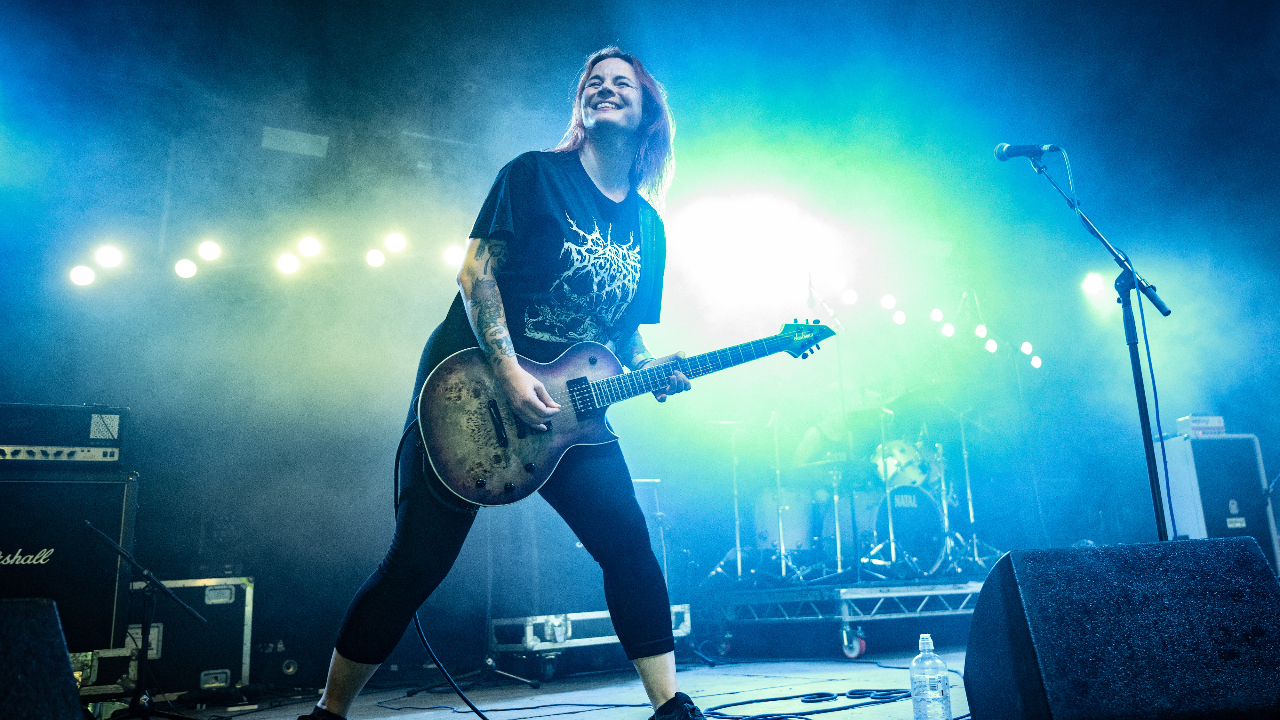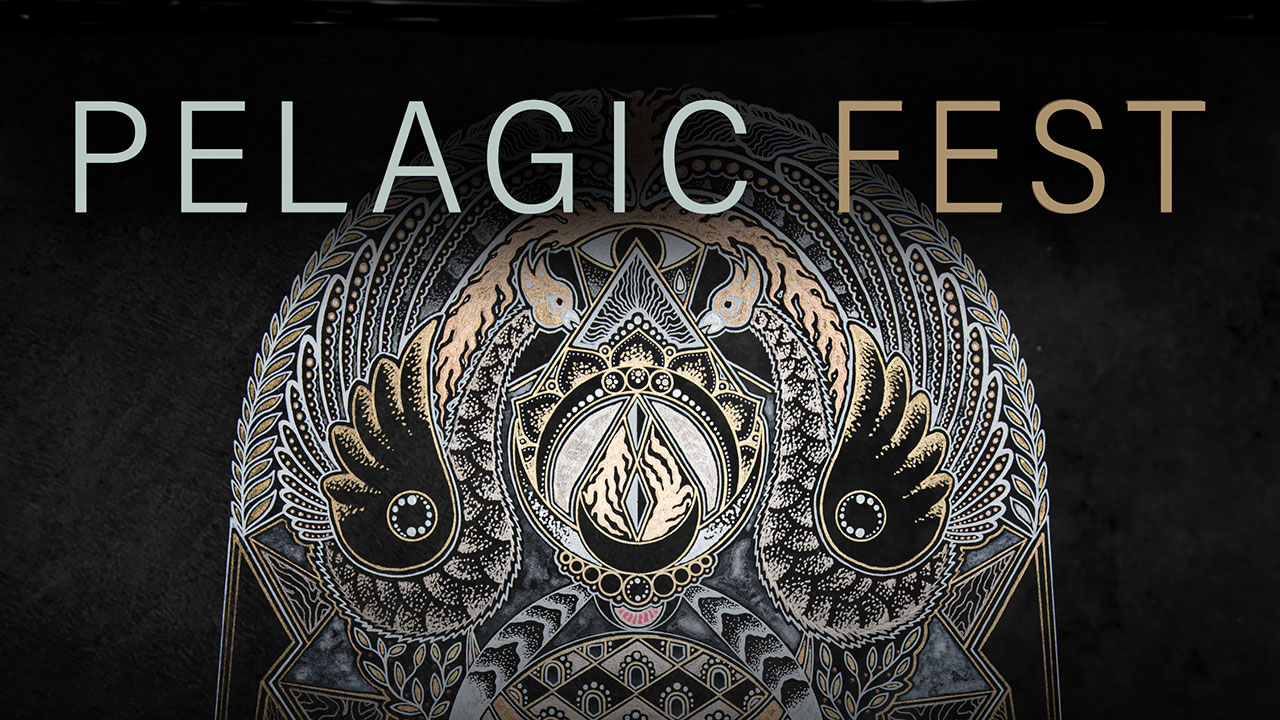I front a metal band and this is what it's like having hundreds of phones pointed at you every night on stage (spoiler: it's really weird)
Serena Cherry, frontwoman of British extreme metallers Svalbard, opens up on the experience of having your every move documented on stage

Picture this: you’re joking around with your friends, having the kind of laughs that contort your face until it looks so full of life that the seams of your skin appear to be on the verge of bursting. Tears stream down your face, a snort escapes your mouth as you gasp for air between giggles.
Then one person pulls out their phone and starts to record. Immediately, that spine crunched over in laughter straightens up, tears are hastily wiped from faces and we all stop looking at each other - to stare down the lens instead.
Our smiles are now strained into a forced replica of the wild grins that preceded them. We have been snapped out of the moment and plunged into heightened self awareness by a camera. It’s difficult to ignore a person filming on their phone and the questions that follow: where will this video be shared? Who will see it? Do I look okay?
Now take that one person filming you, and times it by a thousand.
Walking out on stage to a sea of phones is bewildering. A bewildering privilege. I’m immensely flattered that the audience have not only made the effort to come to the show, but they wish to film and share it on their socials. But it’s hard not to interpret those phones as a different kind of pressure. Suddenly, the audience I am standing in front of isn’t the only audience I’m performing to anymore. The occasion now also belongs to social media and its unforgiving comments section.
As a musician, you want to lose yourself in performing, but it’s hard to be carefree when there are cameras recording your every move. I’ve always maintained that the beauty of live music lies within its deviations - the synergy of the imperfect moment. I mean, a song will always sound the same on record - but every night on tour it will have unique differences that breathe inimitable life into it. Those variations are what make it special, but they can be viewed as mistakes when they’re watched out of the context of the venue. When you glimpse gig footage on a phone, you see how it looked, you hear how it sounded, but you don’t feel how it felt to be in that room. In this respect, you are likely to consume someone else's concert videos on social media with a far more critical mindset.
With this in mind, playing to a sea of phones every night distorts my perspective on performing. I become fixated on mistakes, terrified of flaws - because every single fault will be documented and published. It feels like the antithesis of metal as I fearfully restrain myself from letting 100% loose on stage, just in case a bout of wild windmilling causes me to play a bum note. In my mind, metal has always been about letting go, expressing yourself and embracing imperfections; and yet now I find myself struggling to do just that as I play heavy music on stage. I’m stuck in my head, caving under a pressure for live perfection that wasn’t there 10 years ago thanks to those little rectangular devices held aloft in the air.
Sign up below to get the latest from Metal Hammer, plus exclusive special offers, direct to your inbox!
I also wonder if the prevalence of phones recording at gigs has contributed to the massive rise of backing tracks used by metal bands. Call me a dinosaur, but in 2025, my band Svalbard is now an outlier for not using backing tracks live. A lot of metal bands rely on playback now, and I’m curious where this motivation to mime in metal (of all places!) comes from. Could it be from an insecurity driven by thousands of people filming the show? The pursuit of live perfection has warped the experience into something so pre-constructed it becomes like a cage for the artist.
Another thing that happens when phones are filming me onstage is that I become painstakingly self conscious of how I look. Let’s be real, vocalists can pull some pretty crazy faces when they’re screaming their guts up on stage. After receiving many comments based on my physical appearance on social media, I am now pretty anxious about images of myself being shared online. Gone are the days in metal where you didn’t have to look cool at all times.
I’m not sure how many other musicians will admit to this, but when I see the cameras on me, I do suck in my stomach and tilt my head to avoid a double chin - which I can’t imagine Cannibal Corpse doing in 1999. But times and technology have changed, with phones and social media leading to a fixation on visuals that extends beyond a band's image.The audience don’t just expect the band to look cool, but to also have a dazzling stage show - one worthy of being filmed. Could phones be a reason why theatrical production is making a huge comeback in metal concerts, perhaps?
Don’t get me wrong. I admire the artistry that goes into creating a spectacle of a show, and most of the bands I listen to have some kind of dramatic imagery. I’m not going to kid myself that aesthetics haven’t always been a huge part of metal culture. I just miss when shows weren’t so concerned about how things look for the cameras.
Whilst I appreciate every video I see shared from one of my performances, and I enjoy sharing snippets I’ve filmed of my favourite bands live on Instagram - I believe the domineering presence of phones at shows is a sharp double edged sword. It is harder to connect with an audience when they’re inattentively watching you via their phone screen. And it’s harder for both band and fans to lose themselves in the moment. All those screens can feel like a distracting, impenetrable wall sometimes.
Would shows be better without phones? It’s a question we’ll never be able to answer in this modern age; as inflicting a ‘no phones’ rule upon an audience is too drastic and unfair to the ticket holder. I’m all for people documenting and celebrating the experiences they worked hard to enjoy. But I can’t help but wonder how different it could be, to look out into a crowd and see faces filled with expression instead of the inanimate flat backs of mobile phones.
Svalbard's latest album The Weight Of The Mask is out now
Serena Cherry is the co-lead vocalist and guitarist with British post-hardcore band Svalbard. She also leads Noctule – a Skyrim-themed black metal band – and writes about music, video games and theme parks. She is endorsed by Jackson Guitars.


